Have you ever been told, “Don’t cut your hair on Tuesday!” and wondered why?
What sounds like a simple household rule is, in truth, an echo of ancient wisdom, carried through generations not as superstition, but as a reflection of how deeply time, energy, and cosmic forces shape our daily lives in Hindu thought.
In Hinduism, even acts as ordinary as trimming hair or nails are seen through a spiritual lens. They are tied to planetary energies, ritual purity, and the flow of prana (life-force) within the body. Days like Tuesday, Thursday, and Saturday are observed with caution, not out of fear, but out of respect for the unseen currents that govern nature and the human mind.
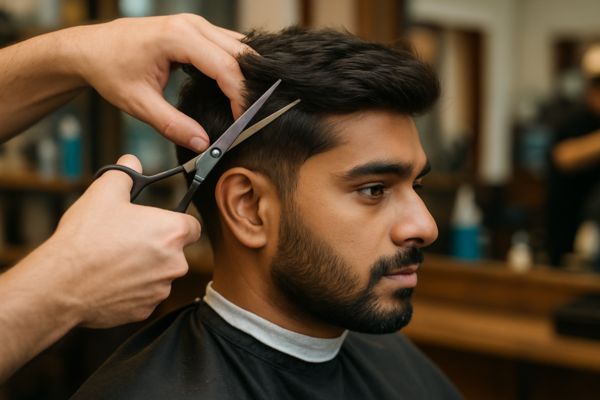
This article will take you through:
Why Tuesday is traditionally avoided for haircuts
What Mangal Dev (Mars) has to do with it
How scriptures, Ayurveda, and Vedic lifestyle view hair and nails
Which other days are sensitive for grooming, and why
And whether these beliefs still hold meaning in your modern life
Read on not just to learn a rule but to understand the energy and intelligence behind it.
What’s the Belief Behind Not Cutting Hair on Certain Days?

In Hindu tradition, actions as ordinary as cutting hair or trimming nails are believed to influence one’s subtle energy, mental clarity, and even karmic rhythm. Certain days, especially Tuesday, Thursday, and Saturday are observed as inauspicious for grooming activities, and this belief is not random. It’s based on planetary alignments, energetic patterns, and the sanctity of time itself.
Time Is Sacred in Hinduism
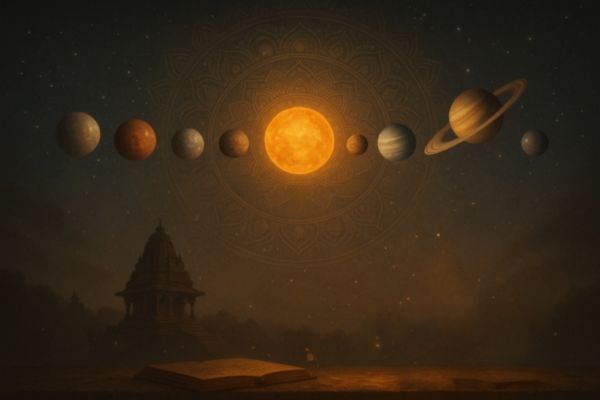
In Sanatan Dharma, Kala (Time) is not just a calendar, it’s a living force governed by planets (Navagrahas) and cosmic deities. Each day of the week is ruled by a specific planet and engaging in certain actions on days ruled by intense or spiritually charged energies is believed to cause imbalance or disharmony.
Hair and Nails as Extensions of Energy

Hair and nails are considered subtle carriers of energy. They are connected to Ojas (vital essence) and pranic flow. Trimming them at certain times is thought to disturb one’s energetic aura, especially on days when the body’s vitality or planetary alignment is vulnerable.
Grooming as a Symbolic Act
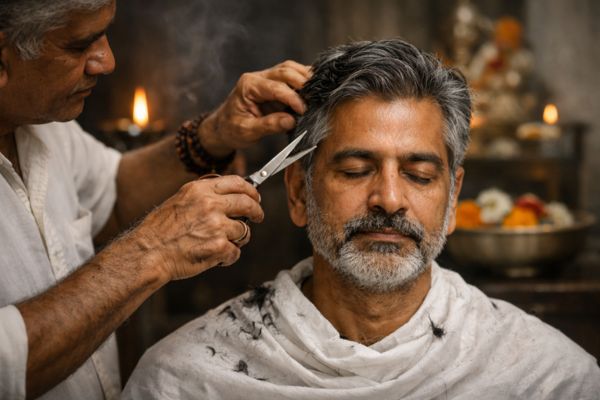
In traditional households, grooming was seen not just as hygiene, but as a symbolic release of excess energy. Cutting hair on days reserved for inward focus (like Thursdays for spiritual learning, or Saturdays for karmic discipline) was believed to disturb one’s inner stillness.
Respect for Planetary Lords
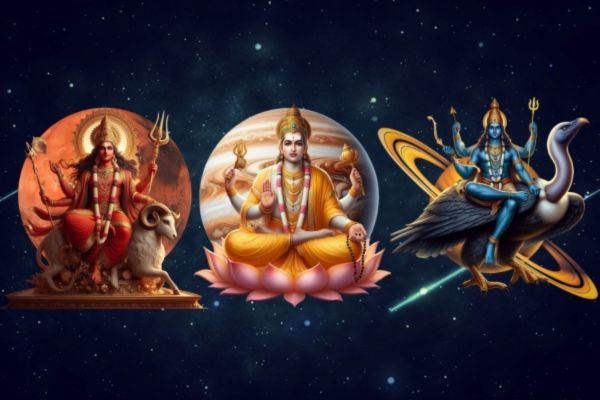
Tuesday is ruled by Mangal (Mars). A fiery, aggressive planet. Avoiding haircuts is seen as a way to not agitate Mars energy, which governs blood, aggression, and accidents.
Thursday is ruled by Guru (Jupiter). A planet of knowledge and growth. Cutting hair on this day is believed to hinder spiritual expansion.
Saturday is associated with Shani (Saturn). Who governs karma and discipline. Avoiding trimming activities shows respect for Saturn’s restraining, reflective nature.
In essence, the belief behind not cutting hair on specific days stems from a deeper reverence for time, energy, and planetary consciousness. It reminds us that in Hinduism, even the smallest acts are part of a larger spiritual design.
Tuesday Is Associated with Mangal Dev (Mars)
_201724.jpg)
In Hindu astrology, Tuesday (Mangalwar) is ruled by Mangal Dev, or the planet Mars. Mars represents energy, blood circulation, physical strength, aggression, and war-like temperament. Traditionally, Tuesday is considered a day of action, discipline, and heat both physically and energetically.
Why Is Cutting Hair Avoided on Tuesday?
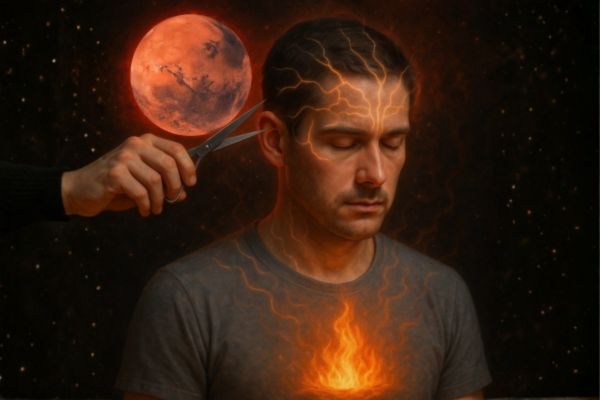
Hair is seen as an extension of the nervous system and is considered a carrier of subtle energy (prana). Since Mars governs blood and vitality, it is believed that cutting hair on this day may disturb the natural flow of internal energy, particularly in the head region where vital nerve endings reside.
There is also an old Ayurvedic view that the body's agni (digestive and metabolic fire) is naturally high on Tuesday. Performing activities that involve minor trauma, like haircutting or nail trimming, could create unnecessary heat-related imbalance in the body’s constitution, especially for pitta-dominant individuals.
Mars and Risk of Accidents

Mars is also linked with accidents, cuts, and injuries. Engaging in sharp-object-related activities on a Mars-ruled day is said to increase the likelihood of minor injuries or bleeding, which in traditional belief could disturb the Mars tattva and attract negative karmic vibrations.
A Day for Discipline, Not Grooming

In many temples and spiritual circles, Tuesday is also observed as a day for Hanuman worship, fasting, or performing tapasya (discipline). Avoiding haircuts or vanity-driven grooming activities aligns with the spirit of restraint and strength that Mars represents.
By avoiding haircuts on Tuesday, the individual is symbolically honouring the fierceness of Mars through discipline, simplicity, and internal focus.
Scriptural and Cultural Roots
Scriptural Guidance

Hindu scriptures provide specific guidelines on grooming practices. The Shiva Purana outlines rituals for hair-cutting and ablution, emphasizing the sanctity of such acts and prescribing specific procedures and timings for them. While the text doesn't explicitly mention avoiding haircuts on Tuesdays, it underscores the importance of performing grooming activities with reverence and at appropriate times.
Additionally, traditional texts like the Nitya Karma Puja Prakash by Gita Press, referencing the Gruhya Sutras, Taittiriya Brahmana, and Varahi Samhita, advise against performing Kshoura Karma (haircutting) on certain days, including Tuesdays and Saturdays, due to their association with specific planetary influences.
Cultural Practices

In ancient India, occupational schedules often influenced cultural norms. Barbers traditionally took Tuesdays off, which may have contributed to the belief that haircuts on this day are inauspicious. Over time, this practical arrangement intertwined with religious beliefs, reinforcing the practice of avoiding haircuts on Tuesdays.
Moreover, Tuesdays are considered significant for worshipping deities like Hanuman and Goddess Lakshmi. Engaging in grooming activities on such days is viewed by some as disrespectful to these deities, potentially leading to misfortune.
Scientific and Practical Angle
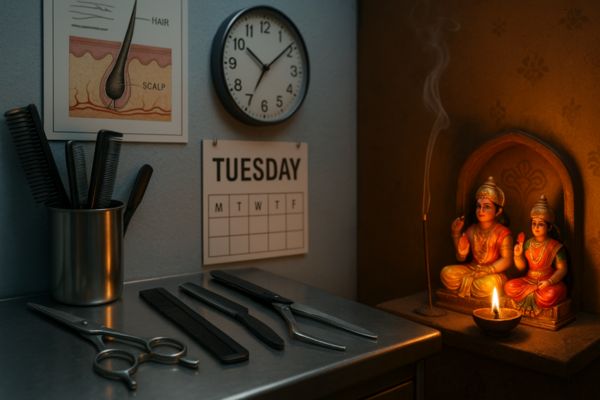
While the spiritual and cultural reasons for avoiding haircuts on certain days are rooted in Hindu tradition, modern science and practical lifestyle patterns also offer interesting perspectives that complement these age-old beliefs.
- Rest Cycles and Healing Potential
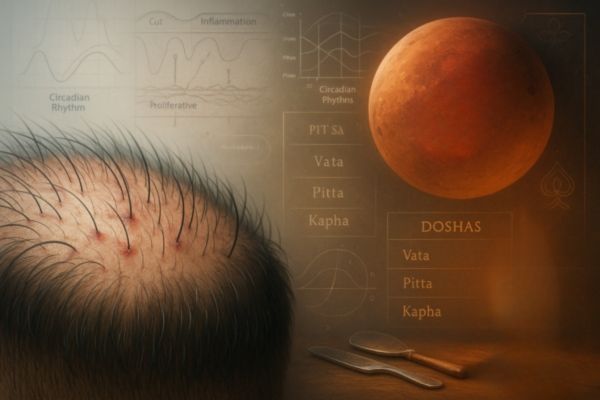
Haircuts involve minor abrasion to the scalp, especially around hair follicles and skin pores. Ayurveda and modern physiology both affirm that the body’s healing and immune responses fluctuate depending on time, stress, and metabolism.
Tuesday, associated with Mars (fire and blood) in astrology, overlaps interestingly with the heightened pitta energy in Ayurvedic theory. Pitta governs blood and sharpness; hair may mildly aggravate this dosha in sensitive individuals.
In practical terms, tissues heal more effectively when the body is at rest, choosing a day of rest or low physical output may be better suited for minor procedures like haircuts.
- Traditional Weekly Work Cycles
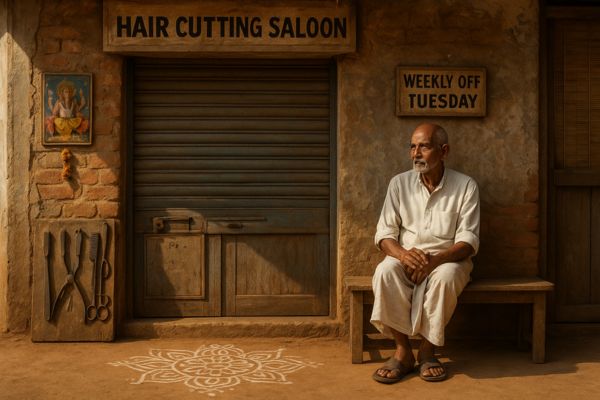
In many regions of India, barbers and grooming professionals historically took Tuesdays off. This weekly off-day had nothing to do with fear, but ensured rest and rhythm for artisans. Over time, this practical norm merged with religious symbolism and planetary associations.
Thus, “not cutting hair on Tuesday” may have originated from a community-wide rest ethic, promoting regular breaks from external grooming and focusing on inner work like prayer, fasting, or discipline.
- Energy Conservation and Mental Quiet
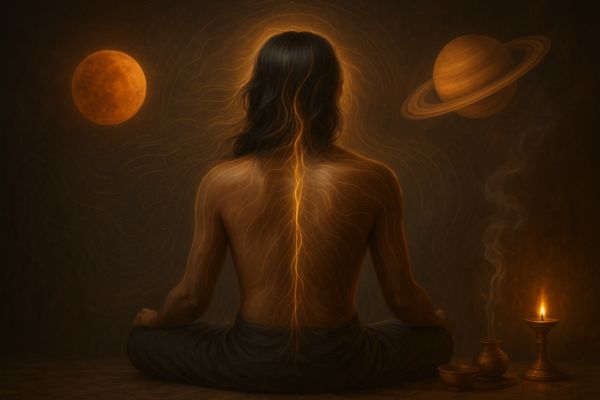
Trimming hair or nails might seem routine today, but in yogic and Ayurvedic systems, these acts influence the nervous system and energetic field. Even subtle changes like cutting the hair can alter:
- Your electromagnetic balance
- How heat and prana move through the head and crown
- The body's response to external stimuli
Taking time off from such stimuli once or twice a week, especially on days aligned with Mars or Saturn, may support greater nervous system calm and subtle awareness.
- Hygiene and Immune Sensitivity

During certain seasons especially monsoon and winter, immune sensitivity increases, and it’s wise to avoid grooming on days when the body is overexposed to cold, fatigue, or stress. This may explain why traditions caution against grooming on Saturday as well, a day ruled by Saturn (linked to slowness and heaviness).
Even from a scientific lens, observing grooming breaks on certain days supports a rhythm that protects health, respects body cycles, and encourages balance.
Spiritual and Energetic Significance of Hair and Nails
In Hinduism and yogic philosophy, the body is not just a physical structure—it is an energy vessel. Every part of it, including hair and nails, is believed to be connected to deeper layers of the self: prana (life force), ojas (vitality), and consciousness.
- Hair: More Than Just Dead Cells
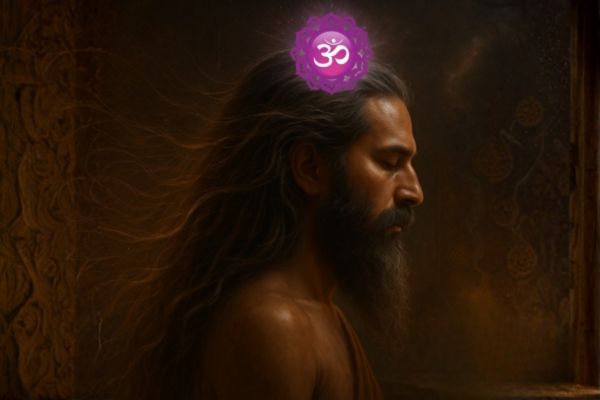
Though scientifically hair is made of keratin and considered “dead,” Vedic and yogic thought views hair as a living extension of the nervous system. The ancient rishis and yogis allowed their hair to grow long because:
- It was believed to help preserve spiritual energy
- It acted as a subtle antenna, enhancing one’s connection to cosmic vibrations
- The crown (Sahasrara) chakra, located at the top of the head, is deeply sensitive, and trimming near it could shift one’s energetic field
Cutting hair, therefore, isn’t viewed casually in traditional systems it is seen as releasing or redirecting energy.
- Nails and Karma
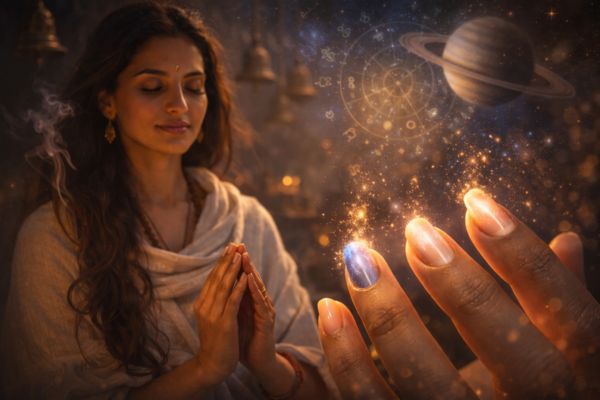
Nails are also symbolically tied to karma and purification. In some rituals, trimming nails and disposing of them properly is a form of removing old karmic impressions. But timing is crucial doing it during certain planetary hours or tithis (lunar phases) is considered inauspicious.
It is common in many households to avoid nail cutting on Saturday, associated with Shani (Saturn), the lord of karma and discipline.
Improper timing is said to interfere with subtle energies being released or retained through the fingertips.
- Energy and Ritual Purity
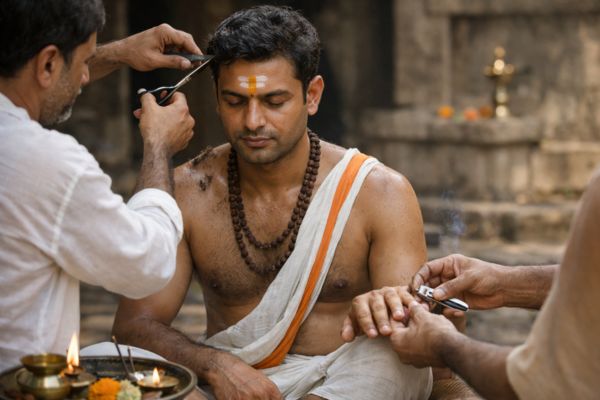
Both hair and nails are trimmed before major pujas, pilgrimages, or vratas (vows) to purify the body and mind. But such acts are traditionally done on specific days and times, to align with the lunar cycle or planetary hours (muhurta), ensuring that the act supports spiritual upliftment rather than disruption.
- Head Region and Subtle Pranic Flow

The head, hands, and feet are key junctions in energy flow. Trimming hair or nails affects these junctions:
Hair (head): connected to Sahasrara and Ajna chakras
Nails (hands/feet): linked with the elimination and circulation of energy
In yogic anatomy, even touching the head with scissors or blades is believed to interfere with pranic movement, unless done with intention and during the right astrological window.
Hair and nails may seem mundane, but in spiritual traditions, they carry vibrational and karmic weight. When trimmed with awareness, they support purity. When trimmed carelessly, they can disturb inner balance.
What Other Days Are Avoided for Grooming in Hindu Culture?
While Tuesday is the most widely known day to avoid haircuts or trimming activities, other days are also considered inauspicious for grooming—each for distinct astrological and spiritual reasons. These practices vary regionally but reflect a shared understanding of planetary energies and ritual timing.
Thursday – The Day of Guru (Jupiter)
_201727.jpg)
Associated Deity:
Brihaspati (Jupiter), the Guru of the Devas
Spiritual Nature:
Thursday is considered a day of wisdom, spiritual growth, and purity.
Why Avoid Hair Washing:
In many households, washing hair on Thursday is avoided because it is believed to wash away knowledge, memory, or good fortune. Cutting hair is seen as an unnecessary disturbance to the sattvic, sacred energy of the day.
This is especially emphasized in homes that follow weekly Guruvar Vrat or perform Satyanarayan Puja.
Saturday – The Day of Shani (Saturn)
_201731.jpg)
Associated Deity:
Shani Dev, the lord of karma, delays, and discipline
Why Avoid Nail Cutting and Haircuts:
Saturday is a day of austerity, reflection, and karmic cleansing. Trimming nails or cutting hair is believed to disturb Saturn’s discipline or bring unnecessary karmic consequences.
Energetic Rationale:
Saturn's energy is slow, grounding, and inward-focused. External grooming is seen as tampering with the body’s aura, which should be left undisturbed on this day.
Many also avoid buying iron tools or sharp objects on Saturdays, which includes scissors and razors.
Ekadashi and Amavasya
Ekadashi:
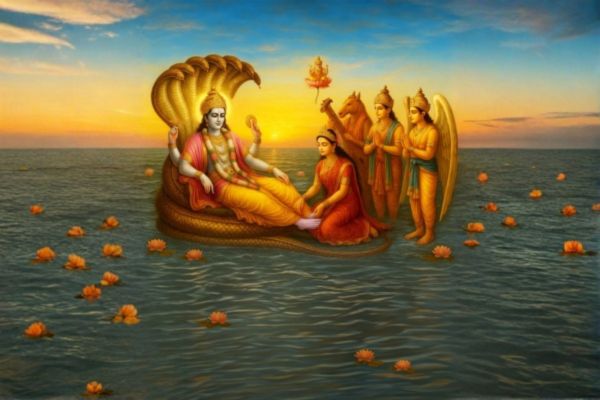
The 11th lunar day is sacred for fasting and spiritual practices. Trimming nails or hair is traditionally avoided to preserve ojas (vital energy).
Amavasya:

The new moon is considered a day of low pranic vibration. Haircuts and nail trimming are avoided to prevent vulnerability to energetic disturbances or negativity.
These practices are not about fear, they are about alignment with cosmic rhythms, allowing the body and mind to remain in tune with higher energies.


-in-Astrology.jpg)
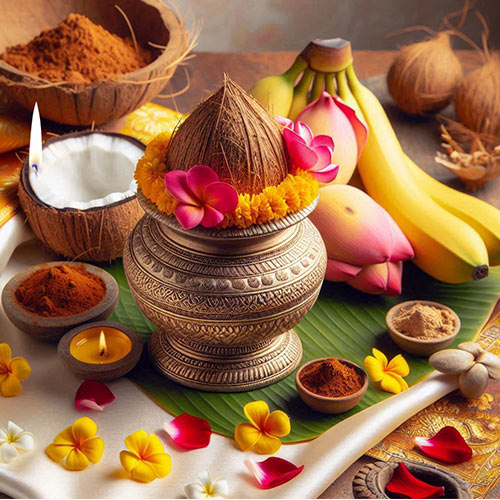
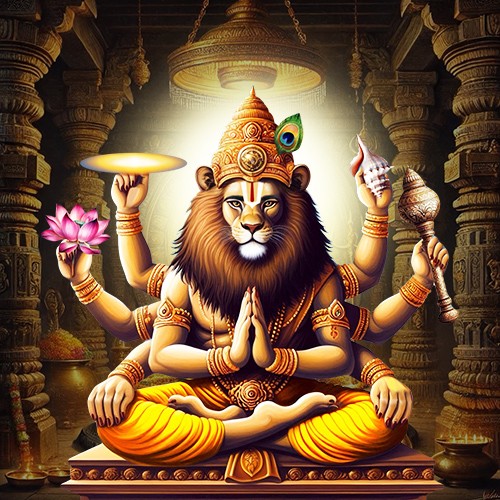

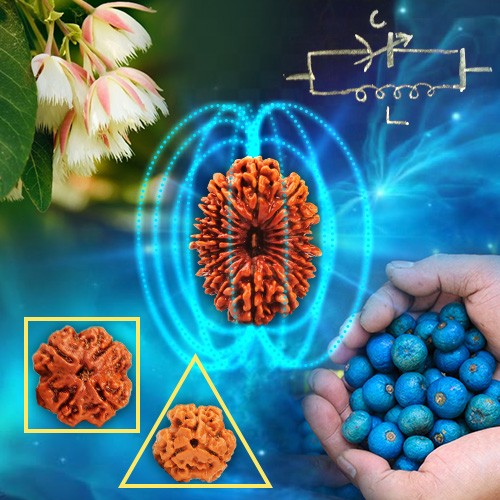

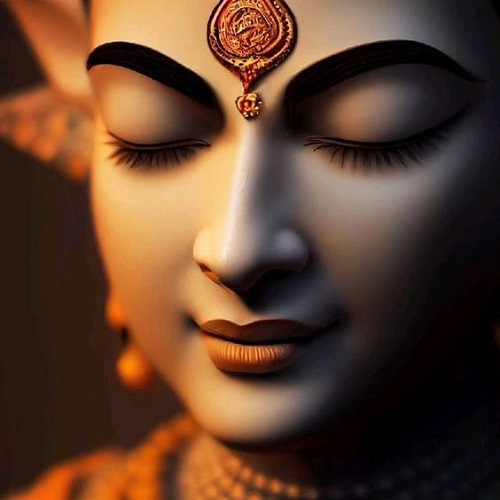
.jpg)


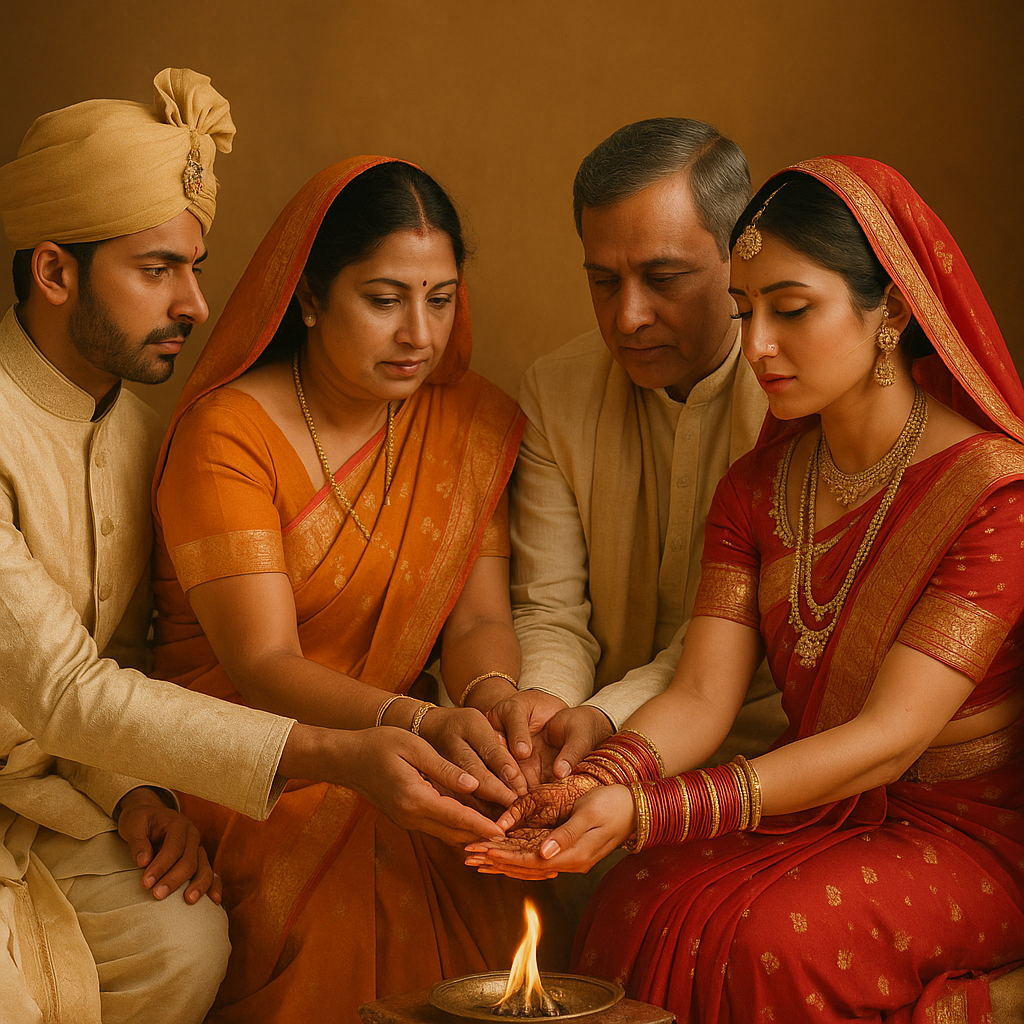
Comments 0
Leave your thought here